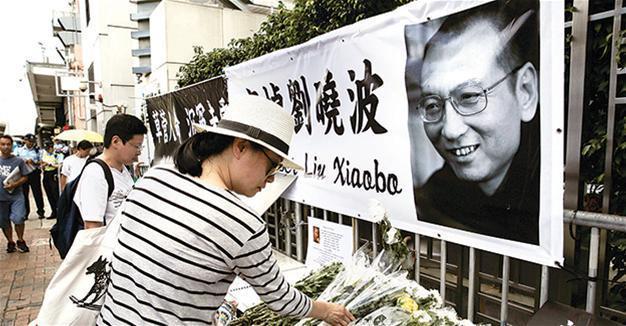China hits back at int’l reaction over Liu’s death
 China lashed out July 14 at international criticism after it denied Nobel laureate Liu Xiaobo’s dying wish to leave the country and faced pressure to set the democracy champion’s widow free.
China lashed out July 14 at international criticism after it denied Nobel laureate Liu Xiaobo’s dying wish to leave the country and faced pressure to set the democracy champion’s widow free.Foreign Ministry spokesman Geng Shuang said Beijing lodged official protests with the United States, France, Germany and the United Nations human rights office over their “irresponsible remarks” regarding Liu Xiaobo, and he took aim at his Nobel status.
“Conferring the prize to such a person goes against the purposes of this award. It’s a blasphemy of the peace prize,” he told reporters.
The United States and the European Union paid tribute to Liu Xiaobo as it urged President Xi Jinping’s government to let his widow, the poet Liu Xia, who has been under house arrest since 2010, leave the country.
Germany voiced regret that Beijing ignored its offer to host Liu while French President Emmanuel Macron remembered him as a “freedom fighter.” Britain hit out at China for preventing Liu from travelling overseas for treatment.
The UN human rights commissioner, Zeid Ra’ad Al Hussein, said Liu “was jailed for standing up for his beliefs.”
While China lodged protests, some of the global reaction to his death was relatively muted, highlighting China’s emergence as an economic and diplomatic superpower on the world stage.
U.S. President Donald Trump and Macron offered praise for Xi at a joint press conference in Paris and only voiced sadness for Liu later in statements. In a sign of China’s growing confidence, the state-controlled Global Times newspaper said in an English-language editorial that “the West has bestowed upon Liu a halo, which will not linger”.
A day after Liu’s death, attention turned to his widow’s fate.
Chinese doctors said she was by her husband’s side when he lost his battle with liver cancer on July 13 at age 61, more than a month after he was transferred from prison to a hospital in the northeastern city of Shenyang.
Liu’s main doctor said he was able to say goodbye to his 56-year-old wife and in his final moments told her to “live well.”
But authorities have restricted her contact with the outside world and her whereabouts were unknown following the death of her husband, a veteran of the 1989 Tiananmen Square protests whose advocacy for democratic reform infuriated the government.
The foreign ministry spokesman said he would “not make prejudgements” about whether Liu Xia could go abroad and that China always handles the entry and departure of its citizens “in accordance with the law.”
U.S. Secretary of State Rex Tillerson paid tribute to Liu Xiaobo and called on China “to release Liu Xia from house arrest and allow her to depart China, according to her wishes.” The EU urged Beijing to let Liu Xia and her family bury the dead democracy campaigner “at a place and in a manner of their choosing, and to allow them to grieve in peace”.
Jared Genser, a U.S. lawyer who represented Liu, said all contact with Liu Xia had been cut off in the past 48 hours.
“I am deeply worried about what’s happening with her right now,” Genser told CNN, adding that it would be hard for the cabinet to still justify holding her without charges.
“The world really needs to rally and mobilize to make sure she can go wherever she wants and that she can bury her husband wherever she wants,” he said.
















